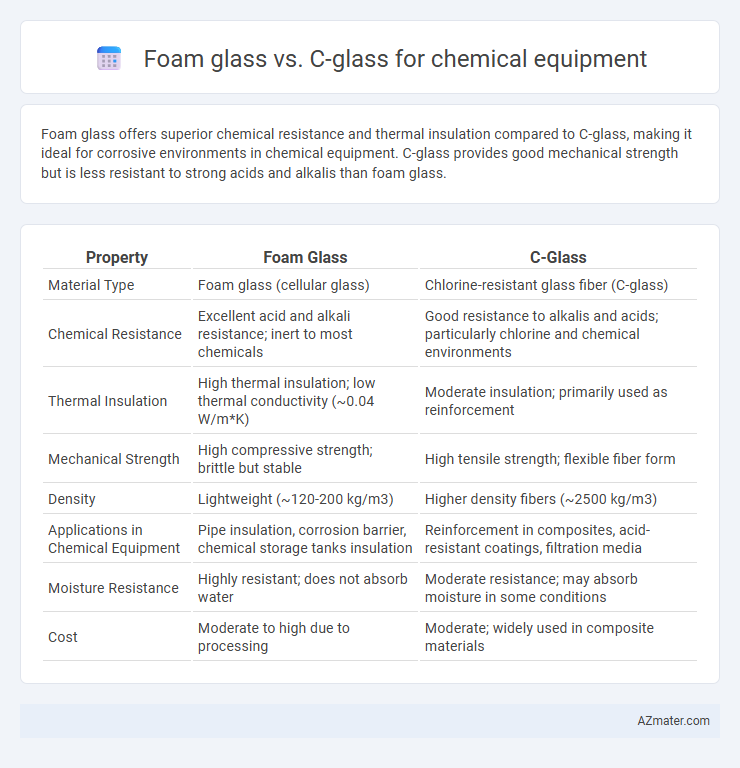Foam glass offers superior chemical resistance and thermal insulation compared to C-glass, making it ideal for corrosive environments in chemical equipment. C-glass provides good mechanical strength but is less resistant to strong acids and alkalis than foam glass.
Table of Comparison
| Property | Foam Glass | C-Glass |
|---|---|---|
| Material Type | Foam glass (cellular glass) | Chlorine-resistant glass fiber (C-glass) |
| Chemical Resistance | Excellent acid and alkali resistance; inert to most chemicals | Good resistance to alkalis and acids; particularly chlorine and chemical environments |
| Thermal Insulation | High thermal insulation; low thermal conductivity (~0.04 W/m*K) | Moderate insulation; primarily used as reinforcement |
| Mechanical Strength | High compressive strength; brittle but stable | High tensile strength; flexible fiber form |
| Density | Lightweight (~120-200 kg/m3) | Higher density fibers (~2500 kg/m3) |
| Applications in Chemical Equipment | Pipe insulation, corrosion barrier, chemical storage tanks insulation | Reinforcement in composites, acid-resistant coatings, filtration media |
| Moisture Resistance | Highly resistant; does not absorb water | Moderate resistance; may absorb moisture in some conditions |
| Cost | Moderate to high due to processing | Moderate; widely used in composite materials |
Introduction to Chemical Equipment Materials
Foam glass offers excellent chemical resistance and thermal insulation, making it ideal for chemical equipment exposed to corrosive substances and extreme temperatures. C-glass, a type of chemical-resistant glass fiber, provides high strength and durability in demanding chemical environments due to its superior alkali resistance. Selecting between foam glass and C-glass depends on specific application needs such as insulation versus structural reinforcement in chemical processing equipment.
Overview of Foam Glass
Foam glass is a highly effective insulation material for chemical equipment, providing excellent thermal resistance and chemical inertness in harsh environments. Its closed-cell structure offers superior moisture resistance and mechanical strength compared to traditional C-glass insulation products. Foam glass's non-combustible and lightweight properties make it ideal for maintaining temperature control while ensuring durability and safety in chemical processing applications.
Overview of C-Glass
C-glass, or chemical glass, is specifically engineered for chemical equipment due to its excellent chemical resistance and thermal stability. It offers superior durability in corrosive environments, making it ideal for tanks, pipes, and reactors exposed to aggressive chemicals. Foam glass, while providing excellent insulation and lightweight properties, does not match the chemical resistance and mechanical strength of C-glass for harsh chemical processing applications.
Chemical Resistance Comparison
Foam glass exhibits superior chemical resistance compared to C-glass, particularly in harsh acidic and alkaline environments commonly encountered in chemical equipment. Its non-porous, inert structure prevents corrosion and degradation from aggressive chemicals, while C-glass may suffer from chemical attack and reduced durability over time. This makes foam glass a more reliable material for long-term protection against chemical exposure in industrial applications.
Mechanical Strength Analysis
Foam glass exhibits superior compressive strength and durability compared to C-glass, making it highly resistant to mechanical stress in chemical equipment applications. The cellular structure of foam glass provides excellent load-bearing capacity and impact resistance, while C-glass, primarily composed of calcium aluminosilicate, offers moderate tensile strength but lower resistance to mechanical deformation. Mechanical strength analysis reveals foam glass's enhanced performance in environments requiring thermal insulation combined with high structural integrity, outperforming C-glass in heavy-duty chemical processing equipment.
Thermal Insulation Properties
Foam glass offers superior thermal insulation for chemical equipment due to its closed-cell structure, providing low thermal conductivity, high compressive strength, and excellent resistance to moisture and chemical corrosion. C-glass, while effective as a reinforcing material, lacks the insulating properties of foam glass and is primarily valued for its thermal resistance and electrical insulation in composite structures rather than bulk thermal insulation. Foam glass's durability and thermal stability at high temperatures make it the preferred choice for harsh chemical processing environments requiring consistent thermal performance.
Durability and Longevity
Foam glass exhibits exceptional chemical resistance, non-porosity, and moisture impermeability, making it highly durable and long-lasting for chemical equipment applications. C-glass, while corrosion-resistant and cost-effective, may degrade faster under harsh chemical exposure and high temperatures compared to foam glass. The superior compressive strength and thermal stability of foam glass contribute to its extended service life in aggressive industrial environments.
Installation and Maintenance Considerations
Foam glass offers superior chemical resistance and durability, making installation easier due to its lightweight, rigid structure and minimal need for protective coatings compared to C-glass, which is prone to chemical degradation and requires frequent maintenance. Foam glass's closed-cell structure prevents moisture absorption, reducing corrosion risks and maintenance intervals, whereas C-glass demands regular inspections and replacement in aggressive chemical environments. The ease of cutting and shaping foam glass facilitates faster installation, resulting in lower labor costs and extended service life for chemical equipment applications.
Cost Comparison: Foam Glass vs C-Glass
Foam glass insulation generally offers higher durability and superior thermal resistance but comes with a higher upfront cost compared to C-glass, which is more cost-effective for budget-sensitive chemical equipment applications. C-glass provides a lower material and installation expense while maintaining adequate corrosion resistance and electrical insulation properties suitable for many chemical environments. Choosing between foam glass and C-glass depends on balancing long-term thermal performance and durability requirements against initial budget constraints.
Application Suitability and Industry Use Cases
Foam glass offers superior thermal insulation, chemical resistance, and durability, making it ideal for cryogenic storage tanks, pipelines, and hazardous chemical containment in the chemical industry. C-glass, characterized by its high electrical insulation and corrosion resistance, is commonly used in chemical reactors, filtration equipment, and reinforced composites exposed to moderate chemical environments. Foam glass excels in applications requiring structural support and moisture resistance, while C-glass suits scenarios demanding lightweight, corrosion-resistant reinforcement.

Infographic: Foam glass vs C-glass for Chemical equipment
 azmater.com
azmater.com